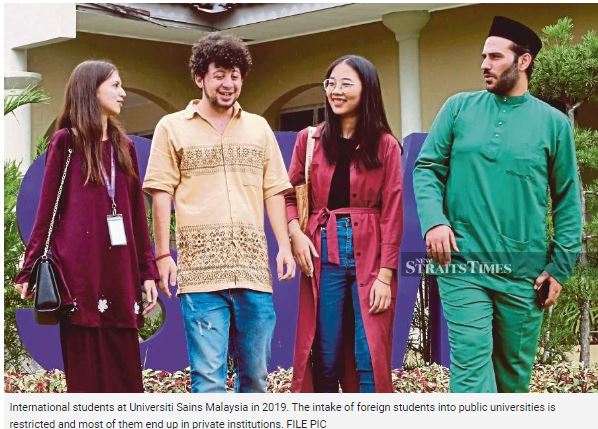Quality of some private varsities appears to be wanting
Emeritus Professor Tan Sri Dato' Dzulkifli Abdul Razak
Opinion - New Straits Times
July 12, 2022
THERE is a new ranking of cities on their "affordability" for students around the world.
Introduced by QS, which is closely associated with the so-called "World University Ranking", we now have another ranking to fuss about.
Kuala Lumpur was ranked by QS as "Asia's most affordable study hub", and placed 28th globally for 2023.
Has this something to do with Malaysia purportedly targeting some 50,000 international students to study in the country's higher education institutions by the end of the year?
Be that as it may, the "ranking" does not seem to resonate well with ongoing developments. Of late, rising inflation is hitting students "as cafeterias and cooperative shops in universities raise prices and sell goods above the market prices".
The ministry is also "empowering the Student Food Banks at universities with the cooperation of other ministries and agencies" — for both public and private.
In addition, the Keluarga Malaysia Student Livelihood Action Committee will be formed to monitor and mitigate further price hikes.
Such widespread concerns tend to blemish the claim of Kuala Lumpur being the most affordable, as alleged by QS.
Once again, it questions the credibility of driving internationalisation as the mainstay of higher education. It looks like the internationalisation policy launched in 2011 may not be on-target any more because of the unexpected havoc the Covid-19 pandemic had caused.
What adds to the confusion is when Malaysia was acclaimed to have some 20 public universities, and more than 400 "private universities". While the former is acknowledged, the latter claim has raised many eyebrows.
During a network session with a colleague who helmed a well-known private university, he said this three-digit figure must have included institutions that were struggling to survive regardless of the quality.
That alone raises other pertinent questions as to how many of these 400-odd private "universities" are worthy to be part of an internationalisation hub?
The answer was provided when the "ranking" of Malaysian universities by QS, a commercially- driven company, was analysed. Without prejudice, assuming that the results are acceptable, it showed that at least half of our public universities are in the top 200 worldwide. The rest were in the top 500. One made it to the top 100 based on the definition of "quality" fashioned by QS.
The powers that be do not show any qualms on the impact of the various categories.
For instance, based on the same criteria, the ranking of the private universities was at best wanting. Only a handful made it to the top 200 or even the top 500.
Meaning to say, the majority are not of the desired "quality" in the context of internationalisation as a goal in turning Malaysia into a credible higher education hub.
Especially for undergraduate education, intake of foreign students into public universities is severely restricted. The preference is more towards private sector institutions, where the bulk of foreign students end up in.
By implication, the sheer number of local private universities that is largely profit-motivated, makes Malaysian higher education more of a private good.
This is a departure from regarding higher education as a public good, as advocated by the United Nations Education, Scientific and Cultural Organisation.
Such a diametrically opposite position can put the internationalisation policy at odds with the universal norms, academically speaking. Some would regard this as a strategic disadvantage in the attempt to be an international higher education hub.
All because one rather naively tends to rely on data set at face value without questioning them as seems to be the case in linearly charting the internationalisation future for Malaysia's higher education.
The writer, an NST columnist for more than 20 years, is International Islamic University Malaysia rector

